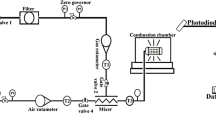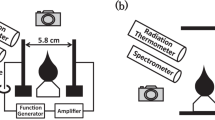Abstract
DURING the past seven years, many hundreds of measurements of the combustion levels1 in flames and explosions have been made. They range from 70 to 99 per cent of the heat of combustion, and without exception they fit into the following analysis of the factors which tend to heighten or lower them.
This is a preview of subscription content, access via your institution
Access options
Subscribe to this journal
Receive 51 print issues and online access
$199.00 per year
only $3.90 per issue
Buy this article
- Purchase on Springer Link
- Instant access to full article PDF
Prices may be subject to local taxes which are calculated during checkout
Similar content being viewed by others
References
NATURE, 139, 67 (1937).
Phil. Mag., 21, 280 (1936).
Phil. Mag., 18, 311 (1934).
Phil. Mag., 21, 280 (1936).
NATURE, 139, 67 (1937) ; also 138, 930 (1936).
Phil. Mag., 22, 513 (1936).
Author information
Authors and Affiliations
Rights and permissions
About this article
Cite this article
DAVID, W. Factors influencing the Height of the Combustion Levels attained in Flame Gases. Nature 139, 289–290 (1937). https://doi.org/10.1038/139289a0
Issue Date:
DOI: https://doi.org/10.1038/139289a0
This article is cited by
Comments
By submitting a comment you agree to abide by our Terms and Community Guidelines. If you find something abusive or that does not comply with our terms or guidelines please flag it as inappropriate.



